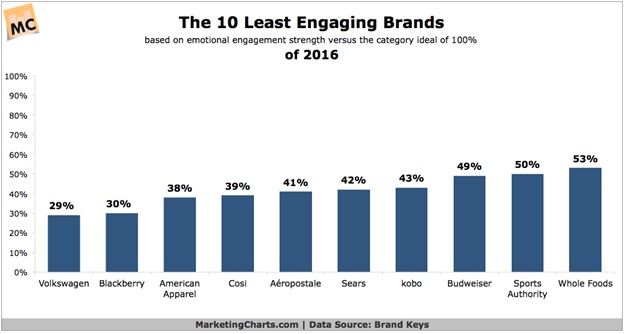
We are used to seeing lists of the best brands in the world. The thinking is that by studying these highly respected companies, we can all learn important lessons about best practices. From Apple to Netflix to Google to Tesla, there is a lot to be said for trying to emulate the qualities that have helped these mega-companies achieve positions of leadership and category dominance.
But isn’t there a lot to be gained by zeroing in on troubled brands – the ones that have proven to be the least engaging? Brand Keys is the company that gives us the pecking order of the best companies, but now they’re focusing on a new list of brands that have problems. And what’s interesting about this group of companies is that it contains names that were once at the top of their respective fields but are now dealing with serious issues.
Here’s the list that you don’t want to be on, courtesy of Marketing Charts and Brand Keys:

We know that BlackBerry and Sears have had problems for some time. But there’s no question that just a year or so ago, we would not have seen Volkswagen or the highly touted Whole Foods on this chart.
We can only surmise about why these troubled companies now find themselves on this infamous list. In the case of BlackBerry and Sears, perhaps a key is their inability to keep up with the times, modernize, and connect with consumer needs. With Budweiser, maybe they lost their focus and found themselves disrupted by the craft beer phenomenon that started with Millennial drinkers.
But in the case of Volkwagen and Whole Foods, the problem revolves around a matter of trust. The car maker now finds itself in the worst possible position, having fudged emissions tests. But of course it runs deeper than that because the company’s lack of transparency throughout the investigation only made matters worse. They’ve angered the EPA, millions of car owners, and in a sense, done harm to the environment. The results are apparent on the chart.
Then there’s Whole Foods. They got caught up in an overcharging scandal. Some say that outside of having to pay a settlement, the healthy food chain never really came clean about whether they knew about the price-fixing policies. Again, it’s not just doing a bad deed, but the lack of transparency that comes back to haunt what was once an incredibly cool and highly admired brand.
A lack of transparency impacts individuals, too. Last week’s apparent revelation about Donald Trump’s PR efforts decades ago made for a funny bit on Saturday Night Live. The story reported in The Washington Post was that The Donald used the name John Miller (and John Barron) to act as his own publicist, hyping his exploits with women and other accomplishments. Trump vehemently denies the voice impersonation, but that didn’t stop SNL from creating a skit.

Did Trump actually do this, is his lack of transparency about it now a problem, and does any of it really matter in the long run? As we’ve learned during his unpredictable run to the Oval Office, it is hard for even Donald Trump to tarnish his own reputation.
But for a radio station or a radio personality, there may not be as much slack. The transparency issue on the airwaves appeared last weekend when syndicated Country star, Bobby Bones, admitted to actually purchasing “anti-Bobby Bones” billboards back in 2013. Bones explained in a new memoir, Bare Bones, that he “launched a massive negative PR campaign against myself to garner sympathy” at a time when the Country community wasn’t wild about his act.

As The Washington Post notes, the campaign worked, and no one had a clue that all those “Go Away Bobby Bones” boards were paid for out of his own pocket. Apparently, iHeartMedia didn’t know either.
So does the obfuscation, and as Bones calls it, “pretty desperate measures” to get ratings, come back to bite him? Does the lack of transparency during the past few years, followed by this act of coming clean, make it all better?
Transparency is a very difficult quality to game and manipulate. It takes courage to show your cards, especially if they reveal uncomfortable truths. For Whole Foods and Volkswagen, both brands find themselves in the penalty box for both their deeds and their lack of transparency.
Eventually, the truth always seems to come out. In Bones’ case, he at least revealed his own secret, even though it was well after the fact. For him and Trump, will the power of their personalities help them avoid ending up on a “least engaging” list? And will these events only serve to heighten their personal reputations?
Stay tuned.
- What To Do If Your Radio Station Goes Through A Midlife Crisis - April 25, 2025
- A 2020 Lesson?It Could All Be Gone In A Flash - April 24, 2025
- How AI Can Give Radio Personalities More…PERSONALITY - April 23, 2025




Two other brands to note on the chart in your blog post. Sports Authority announced today that they couldn’t find a buyer for their assets, so they’re closing all 400+ of their stores instead of the 160 they said they’d close when they filed for bankruptcy. Their brand had so much stink on it (like others on the list) that they couldn’t save any part of it. And American Apperel has also filed for bankruptcy.
There’s no question that in the real time instant gratification world that we live in that being transparent, being honest even if the news is bad, and dealing with situations quickly and fully are all important to a brand’s reputation and to consumers choosing to use that brand. That applies to broadcast companies, individual stations, and Air Personalities. People, especially those under 40, have very keen “bullshit detectors” and can spot a fake, a half-truth, or a liar from a mile away now.
Being real, being honest, and being strong enough to face the unpleasant are going to be more and more important to the success of any brand. Those who don’t embrace those concepts, even individual Air Personalities, will lose out to the competitors who do.
Mark, thanks for the observations on Sports Authority and American Apparel. You have to do things wrong over a period of time to end up on this list. I think your “take” on young people’s “BDs” is spot-on, but I also think the Internet has enabled those of us over 40 to gain an understanding about people and companies that just wasn’t available in the ’60s, ’70s, and ’80s. Appreciate you taking the time to comment.